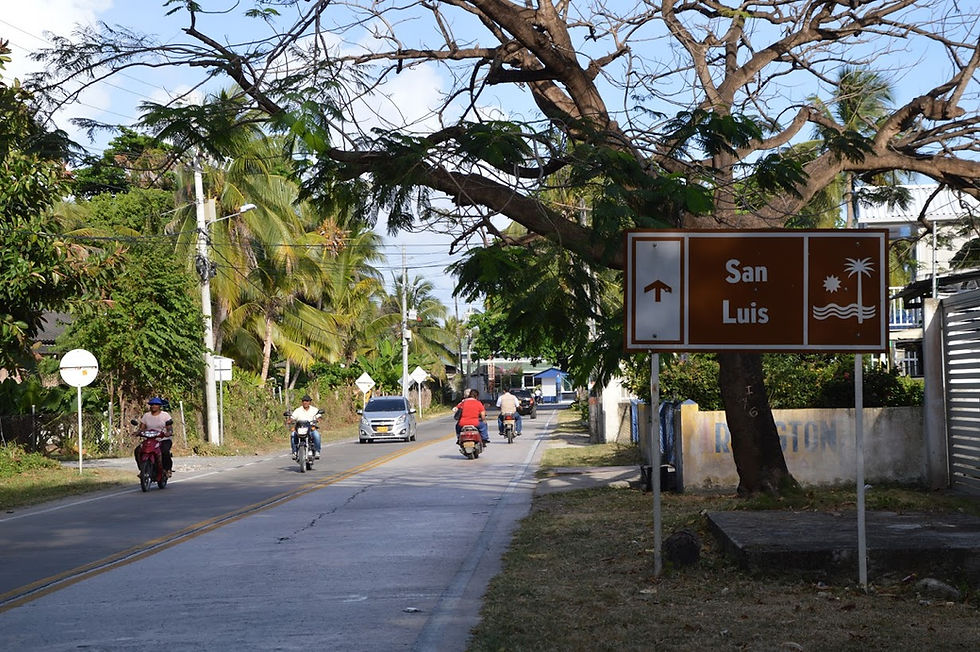Documentary: Marooned in the Caribbean
- Caribbean Entertainment Magazine
- Jul 30, 2018
- 3 min read
Nobody escapes from blood and thunder in Colombia, and definitely not those in the department of the archipelago of San Andres, situated closer to Managua and Kingston than to Bogota.

MAROONED IN THE CARIBBEAN is a new documentary project launched and directed by Award-winning Director, Producer, and Anthropologist Linda Aïnouche. It aims to document the awful, desolate living conditions endured by the Raizal people, the native inhabitants of San Andres. Sons of slaves, English speakers, mainly Baptists with definite habits and customs, these islanders have unmercifully fallen prey to Colombianization. This is a process which kills the Raizal culture through the killing of Raizal individual souls. Colombianization subjugates the Afro-descendants of San Andres to an ethnocide.
In recent months, Linda went several times to San Andres to meet islanders and record their voices, that have been wrecked by the depths of despair and tears. Going back and forth on a scooter with a small camera on her backpack to meet one Raizal after another, all of whom were active combatants in their struggle for existence, Linda has captured harsh slices of life under oppression, full of pangs of emotion.
The documentary will exhibit how San Andres Islanders cry out their pains and fears of disappearing, the violations of their human rights, the loss of their culture and territory, and the unfairness they are subjected to in the name of geopolitical and political strategies.
At the present moment, their abandoned and isolated Caribbean islands to the rest of the world hold the worst of a bunch of miseries (drug trafficking, gun smuggling, prostitution, robbery, bribery, kidnapping, repression...) where inexorably police are thieves in the streets.
MAROONED IN THE CARIBBEAN calls awareness to the reality that Raizal people are fiercely mistreated whilst their identity is ceaselessly perishing.

San Luis is one of the primarily Raizal neighbourhoods of the archipelago, where a vast majority of the minority that Raizal people have today become on their own land, live.

Raizal territory has become one of the most lucrative touristic destinations for the state of Colombia, whilst the Raizal people continue to be abjectly forsaken and dispossesed by their government.

Raizal devotes at a service in the First Baptist Church founded in 1844 by Philip Beekman Livingston, Jr. located in Loma, on the land where the slaves of his family, brought to San Andres, had been the first to be freed a decade earlier with a copy of Queen Victoria's Abolition of Slavery Act in hand.

The Colombian Government's
The Colombian Government's Secret Plan for the archipelago has ultimately come to be effectively implemented. The intention to reduce the Raizal people, Raizal culture, Raizal territority, Raizal rights and Raizal identity to nothing has been seen through.

November 19, 2012, the Raizal people have lost a good amount of their sea territory which has been bequeathed to Nicaragua in the aftermath of a trial at the International Court of Justice in The Hague, under one of the conditions that the archipelago was uninhabited. This was expressly formulated by the Colombian government.

In 2000, UNESCO declared the San Andrés archipelago a Seaflower biosphere reserve, in order to help protect its ecosystems from overexploitation and other direct threats. Nowadays, the coral reef has been fully destroyed, the massive garbage in the sea from tourism is uncontrollable, and coupled with overpopulation on the islands, global warming continues to cause irremediable
damages to the environment.








Comments